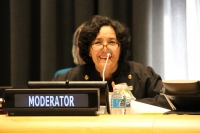GCPEA News
Farewell from Leila Zerrougui: Special Representative of the Secretary-General for Children and Armed Conflict
March 31, 2017
Dear friends and colleagues,
After four and a half years as UN Special Representative for Children and Armed Conflict, the time has come to say goodbye.
But first, I’d like to thank all of you for your commitment, unwavering support and work to alleviate the plight of children affected by armed conflict. When I arrived in 2012, I was impressed by the international community’s engagement to create a mandate with mechanisms and tools to protect children affected by war and by my predecessors’ vision and achievements.
Together, we have accomplished a lot and I know that my successor will inherit – just like I did – a strong team, both at UN Headquarters and in the field, to continue our constructive engagement on behalf of children with the UN’s governing bodies, Member States, civil society and parties to conflict.
Among the proudest achievements of my years as Special Representative is the global consensus, cemented through ‘Children, Not Soldiers’, that children do not belong in security forces in conflict. The campaign has helped the UN, Member States and all our NGO partners, to work with the national authorities concerned to address gaps, build capacity and develop strong national ownership of measures included in Action Plans to end and prevent the recruitment and use of children. Challenges remain, especially in countries where conflict is raging and where parties are too divided to make space for mediation and for progress to take place. Despite these difficulties, I can say with confidence that years of advocacy have allowed us to reach a turning point. We are no longer working to change attitudes. We are now able to view what used to be the intractable problem of child soldiers as an issue that can be resolved with political will and practical measures.
As a result, this crucial work to address child recruitment by Member States in conflict is opening new doors to engage with non-State armed groups – the majority of parties listed by the Secretary-General – and has also helped to lay the foundation to address other grave violations.
This week’s international conference in Argentina on the protection of schools is one example of the dynamic engagement and positive developments taking place to keep children in school in the midst of conflict. Efforts to protect healthcare, and to curb sexual violence in conflict are just as impressive.
Peace processes were identified early on as opportunities to include children’s rights, needs and protection. However, over the years, boys and girls were too often forgotten when parties sat down to negotiate the aftermath of conflict. This is changing, and I am hopeful that the agreement reached in Colombia will be emulated elsewhere in the world.
I am deeply grateful for the innovative work of the NGO community and for the unwavering support of Member States, channelled in part through the Groups of Friends in New York, Geneva and in many countries implementing Action Plans.
Real progress is never achieved alone and I also want to recognize the exceptional contribution of our UN colleagues, especially our closest partners: UNICEF, the Department of Peacekeeping Operations and the Department of Political Affairs. They played a crucial role as I have sought to intensify cooperation between a wide range of child protection actors and to develop new alliances for children. As an example, partnership agreements with regional organizations, implemented in close cooperation with UN partners, have helped us to increase ownership and commitment to the protection of boys and girls affected by war.
While it is important to reflect on the progress accomplished, we cannot forget that twenty years after the creation of this mandate, our work is far from over. As I leave this office, I am haunted by the stories of the children I met in my travels to countries affected by war.
I am humbled by the reality that for every child we help, there are countless others we cannot reach and whose lives are forever broken by the brutality of today’s wars.
Protecting children in situations of armed conflict is an endeavour in constant evolution. We face recurring challenges in which our response is improving. But I feel we are also struggling to adapt to the new tactics used by belligerents. Collaboration is needed more than ever to devise innovative solutions to address issues such as violent extremism, to reach children in detention or to assist the millions of boys and girls displaced by conflict.
My successor will inherit a strong mandate with broad support, but also challenges with deadly consequences for boys and girls. I count on everyone’s continued engagement to support the mandate, find and exploit every opportunity, big and small, to act on behalf of all the children affected by conflict.
I often say it is easier for children to turn the page on the horrors of conflict because they have their entire lives in front of them. That is why we have such an important role to play to make sure children deeply affected by war have access to services to help them recover and opportunities to build the future of hope and peace they want. The future we want for everyone.
I am honoured to have been able to serve as the Secretary-General’s Special Representative for Children and Armed Conflict. As I am moving on, the children, colleagues and friends I met in the past four years will always remain close to my heart.





